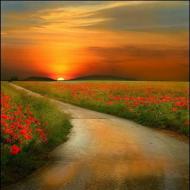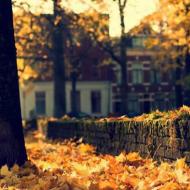
How nature is depicted in Tyutchev's lyrics. Essay on the topic “Depiction of nature in the lyrics of F
Fyodor Ivanovich Tyutchev is not only a poet, he is a philosopher trying to understand the mysteries of existence, the place and role of man in life. In his works, he identifies the person himself with a traveler, on whose road there are happiness and sorrow, gains and losses, tears and joy. I.S. Aksenenko said about Tyutchev: “For Tyutchev, living means thinking.”
But Fyodor Ivanovich’s works had not only a philosophical and psychological orientation: he also had many lyrical works in which he sought to convey admiration for the beauty of nature and its understanding.
Tyutchev was an excellent landscape painter who perfectly described nature with the help of artistic images. But he is not a simple contemplator of nature, he is trying to understand its meaning, to penetrate into its life, as if into the soul of a person.
Tyutchev finds complete harmony in nature. However, just as in human life he saw contradictions and difficulties, so in the manifestations of nature he sees “chaos” and “abyss”.
The source of mysterious beauty, the highest power is nature. In Tyutchev’s works, the human mind bows before it:
Not what you think, nature:
Not a cast, not a soulless face.
She has a soul, she has freedom,
It has love, it has language.
The first thunder “frolics and plays”, spring is “blissfully indifferent”, “a mantle of gold is thrown” - all this causes the poet’s lively excitement. He is delighted and delighted by thunderstorms, storms, and rough seas. All this is reflected in the opening lines of some of F. Tyutchev’s works: “How good you are, O night sea...”, “Spring thunderstorm”, “In the original autumn...”, “How joyful is the roar of summer storms... ", etc. When I read the poems of this poet, I have feelings that are similar to the experiences and feelings of the author that possessed him at the time of their creation. At the same time, you begin to feel the charm and beauty of the world around you:
A swift stream runs down the mountain,
The noise of birds in the forest is not silent,
And the noise of the forest, and the noise of the mountains -
Everything cheerfully echoes the thunder.
You will say: windy Hebe,
Feeding Zeus's eagle,
A thunderous goblet from the sky,
Laughing, she spilled it on the ground.
A thunderstorm always causes fear in a person. These same lines show a completely different thunderstorm. All nature cheerfully echoes her: the flow is agile, and the din of birds does not stop.
However, the poet sees nature from the other side. For him, it acts as a kind of element, before which a person is completely powerless and alone. Much is inaccessible to man, he cannot understand everything, therefore the thought of the mystery and spontaneity of nature in F. Tyutchev’s soul causes anxiety and hopelessness:
The night sky is so gloomy
Clouded on all sides
It’s not a thunderstorm and I’m not thinking,
It's a lethargic, joyless dream.
The transience of human life evokes superstitious fear in the poet. This feeling intensifies at night, when the abyss of non-existence is exposed, tearing away the “fabric of the blessed cover” from the world:
And the abyss is laid bare to us
With your fears and darkness,
And there are no barriers between her and us -
This is why the night is scary for us!
But all those feelings that possessed the poet: joy, faith in the triumph of harmony and beauty, sadness or anxiety - were intertwined in his poems with nature. All this gives his lyrics a gripping power:
Oh, how in our declining years
We love more tenderly and more superstitiously.
Shine, shine, farewell light
Last love, dawn of evening!
Half the sky was covered in shadow,
Only there, in the west, does the radiance wander, -
Slow down, slow down, evening day,
Last, last, charm.
Nov 22 2012
The theme of nature has always been of interest to many Russian poets and occupied one of the main places in their poetry. Nature is self-sufficient, its existence is serene and calm. This can be seen in the poems “Summer Evening”, “Morning in the Mountains”, “Snowy Mountains”, etc. These lyrical works emphasize silence and harmony, which is conveyed by the key words “bliss”, “whisper”, “trembling”. He unmistakably finds vivid comparisons and epithets, conveying smooth transitions from day to evening, from summer to autumn, etc.
Tyutchev’s nature is changeable and dynamic. She knows no peace, everything is in the struggle of opposing forces, she is multifaceted, full of sounds, colors, smells. the poet is imbued with admiration for the greatness and beauty, infinity and diversity of the natural kingdom. The beginnings of his poems are characteristic: “How good you are, O night sea...”, “In the original autumn there is a short but wonderful time...” (1857), “How joyful is the roar of summer storms...” (1851), “I love a thunderstorm in early May.” …”. Tyutchev is especially attracted to transitional, intermediate moments of nature. It depicts an autumn day, reminiscent of the recent summer (“There is in the original autumn...”), or an autumn evening - a harbinger of winter (“Autumn Evening”) (1830). He sings of a thunderstorm not at the height of summer, but of the “first thunder of spring” “at the beginning of May.” He depicts the first awakening of nature, the turning point from winter to spring (“The earth still looks sad, but the air already breathes in spring…”) (1836). Nature in Tyutchev’s poems is humanized and spiritualized. Like a living being, she feels, breathes, rejoices and is sad. The very animation of nature is usually found in poetry. He “accepted and understood the living beauty of nature not as his fantasy, but as the truth.”
Nature as the main plot in Tyutchev’s poems:
Not what you think, nature:
Not a cast, not a soulless face -
She has a soul, she has freedom,
It has love, it has language...
Depicting nature as a living being, Tyutchev endows it not only with a variety of colors, but also with movement. The poet does not paint just one state of nature, but shows it in a variety of shades and states. This is the existence of nature. In the poem “Yesterday,” Tyutchev depicts a ray of sunshine, the movement of the ray, how it gradually made its way into the room, “grabbed the blanket,” “climbed onto the bed,” we feel its touch.
Nature is always close to us and easy to perceive. And this is its extraordinary charm. With deeper penetration, however, one can see that behind the external simplicity is hidden a majestic world, full of harmony and beauty, which amazes the reader with its perfection. And most importantly, this world is alive. Nature for Tyutchev is a temple. But not dead, created from stone by human hands, but full of life, natural and spiritual. Tyutchev does not have “dead nature” - it is always full of movement, imperceptible at first glance, but in fact continuous, almost eternal. And Tyutchev bows to this movement of life, thanks to which, perhaps, man exists:
Nature does not know about the past,
Our ghostly years are alien to her,
And in front of her we are vaguely aware
Ourselves are just a dream of nature.
Tyutchev's shortest poems are almost always the most successful. His sense of nature is unusually subtle, alive and true. Comparisons of the human world with the related world of nature are never strained and cold in Tyutchev, they do not respond in a didactic tone, they do not try to serve as an explanation of some ordinary thought that appeared in the author’s head and was accepted by him as his own discovery. In addition to all this, a subtle taste is noticeable in Tyutchev - the fruit of a multifaceted education, reading and rich life experience.
But where Tyutchev is a perfect master, who has few others like himself, is in the depiction of pictures of nature. There is, of course, no plot more hackneyed by poets all over the world. Fortunately, the plot itself, that is, nature itself, is not at all vulgarized by this, and its effect on the human spirit is no less irresistible. No matter how many thousands of writers try to convey to us its language, it will always and forever sound fresh and new, as soon as the soul of the poet comes into direct communication with the soul of nature. That is why Tyutchev’s paintings are filled with the same immortal beauty as nature itself is immortal.
There is in the initial autumn
A short but wonderful time:
The whole day is like crystal
And the evenings are radiant.
Where the vigorous sickle walked and the ear fell,
Now everything is empty: space is everywhere, -
Only a web of thin hair
Glistens on the idle furrow.
The air is empty, the birds are no longer heard,
But the first winter storms are still far away,
And pure and quiet azure flows
To a resting field.
Nothing can be added here; any new feature would be superfluous. This “thin hair of a cobweb” is enough to resurrect in the reader’s memory the former feeling of such autumn days in all its completeness.
Or this, the other side of autumn:
There are in the brightness of autumn evenings
Touching, mysterious charm:
The ominous shine and diversity of trees,
Crimson leaves languid, light rustle,
Misty and quiet azure
Over the sad orphaned land,
And like a premonition of autumn storms,
Gusty, cold wind at times.
Damage, exhaustion, and everything
That gentle smile of fading,
What in a rational being we call.
The sublime modesty of suffering...
Not to mention the beautiful, graceful image of “shameful suffering” - the image into which Tyutchev transformed the feeling of an autumn evening; this evening itself is reproduced with such precise, albeit few, features that it is as if you yourself feel and experience all its eerie charm.
This motif was repeated by Tyutchev in another, but autumn is more touching, gentle and sympathetic:
Enveloped in a thing of drowsiness,
The half-naked forest is sad;
Of the summer leaves perhaps the hundredth,
Shining with autumn gilding,
There is still rustling on the branch.
The same truth is in this picture of autumn:
So sometimes in the autumn,
When the fields are already empty, the groves are bare,
Pale sky, cloudier than the valley, -
Suddenly the wind blows, warm and damp,
The fallen leaf will be driven before it,
And he will pour over your soul as if in spring...
It is the warm and damp wind. This is exactly what you need. It seems like such simple words, but this is the dignity, this is the beauty: they are simple, like the truth itself.
Here are some more examples of Tyutchev’s depiction of nature:
The hazy afternoon lazily breathes,
The river rolls lazily
The author of brilliant lines about Russia, which cannot be measured by a common yardstick, according to K. Pigarev (literary critic, grandson of F.I. Tyutchev), is perceived by people, first of all, as a unique singer of nature. During the years of Soviet power, the work of this poet was not given due attention due to his social position; Tyutchev’s landscape lyrics were only briefly mentioned.
In our time, his poetry is recognized as the most precious asset of Russian classical literature, and the author of brilliant lines deservedly becomes especially quoted. But all the same, the poetic work of this famous wit and subtle thinker remains not fully studied and appreciated.
Unique property
Fyodor Ivanovich Tyutchev (1803-1873) - academician and diplomat, an adherent of traditional values and order, which he defended in his journalistic activities, was a subtle lyricist who selflessly loved Russian nature. This amazing poet has amazing ones, such as “Modern,” for example, but man and nature in Tyutchev’s lyrics attract special attention from both fans of the poet’s work and critics. The author himself did not attach much importance to his poetic creativity, but it, consisting of more than 400 poems, always attracted smart and talented literary scholars, such as Yuri Nikolaevich Tynyanov. He, like I. Aksakov, appreciated the poet’s legacy. And Fet, paying tribute to the significance of the poet’s work, wrote the following words on a book of Tyutchev’s poems: “This book is small, many volumes are heavier.”
Beautiful and informative
Tyutchev's landscape lyrics from all periods of his work reflect the feelings of the great poet, which he loved selflessly. She always put him in a special joyful mood, delighted and calmed him. F.I. Tyutchev never described dirt and shortcomings, did not call Russia “unwashed” - this was not typical for him.

There is no trace of despondency inspired by nature in his poems. And some, according to Yu. Tynyanov, “fragments” (or “compressed odes” - this is what the literary critic called Tyutchev’s poems because of their maximum richness and intensity) sound like a joyful, triumphant hymn - for example, the well-known poem “Spring Thunderstorm”.
Priority of nature
Both man and nature in Tyutchev’s lyrics are meaningful in a special way. The poet endows nature with human feelings and characteristics. He claims that man himself can only be happy in merging with nature.

And if he is not in harmony with her, then he is deeply unhappy, but this is not nature’s fault. This homo sapiens, having absorbed the evil of chaos, lives an unnatural life, unable to understand and let the blessed world of nature into his heart.
The splendor and diversity of the surrounding world
Man and nature in Tyutchev’s lyrics are subject to passions and storms, which the poet tries to understand and comprehend. In his own way he is both an artist and a composer - his poems are so picturesque and musical. Having become acquainted with Tyutchev’s poetry, it is impossible to forget it. According to I. Turgenev, only those who are not familiar with his work do not think about Tyutchev. The poet, admiring nature, always finds something unknown in it, which promises interesting discoveries and only positive emotions. And the ordinary and mundane are not capable of carrying any joy.
Unique and self-sufficient
Fyodor Ivanovich was absolutely right in considering man to be the source of all troubles - a weak, disharmonious creature, unable to cope with his passions and vices, bringing destruction to nature. Whereas she all lives only according to the universal law of triumphant life.

Tyutchev's landscape lyrics glorify the self-sufficiency and majestic tranquility of nature, devoid of tearing passions. There are elements, but these are phenomena caused by the life of nature, and not by its malicious intent. And Tyutchev did not glorify tsunamis and volcanic eruptions - he was a patriot in the highest sense of the word and loved Russian nature. Some researchers believe that the term “landscape lyrics” by Tyutchev is more consistent with the phrase “landscape-philosophical.”
Poems about love
Tyutchev's lyrics occupy a certain place in the heritage. His poems about love are, so to speak, highly moral. An aristocrat of spirit, he did not like to flaunt his inner world, considering it shameful. But his lines, known to absolutely everyone - “I met you, and everything that was past came to life in an obsolete heart ...” - testify to the ability to write about love in simple words, behind which a great feeling is hidden. F.I. Tyutchev glorifies the feeling that lights up the stars, sublime and beautiful. Among modern cynics, it may cause rejection - just look at the “reviews”. But such statements only confirm what the poet wrote about - man is the bearer of evil on earth.
Diverse and dynamic
The main motives of Tyutchev's lyrics are devoid of far-fetchedness. A person with all his diversity of feelings, nature, unsolved, mysterious, but perfect and beautiful, love for a woman and the Motherland - everything is filled with drama, but taken from real life. The poet never tires of admiring the world, nothing bores him, nothing tires him. He tries to glorify the changeable, multifaceted nature in all its manifestations, to capture the moment of transition from one picture to another.
Live nature
The features of the depiction of nature in Tyutchev’s lyrics have already been noted above. This is the identity of the human soul, his feelings and experiences with the phenomena of the external world, and the animation of nature. F.I. Tyutchev constantly draws parallels between different periods of human life, the state of his soul and natural phenomena. This is one of his main artistic techniques.

The animation of nature is emphasized by words such as “the spirit fell asleep.” The poet himself calls nature not a cast and a soulless face, but something that is capable of breathing freely, loving and telling about all this to a caring, sensitive person.
One whole
The theme of nature in Tyutchev’s lyrics is the main and leading one. He finds amazing, touching words to describe her, for example, “the divine modesty of suffering.” This is how the poet speaks about autumn, about the quiet withering of nature. And how does he describe a ray of sunshine that “grabbed the blanket”, or what are his words about the evening worth - “the movement was exhausted, the work fell asleep...”. Few people can find such words.

From all that has been said, we can conclude that man and nature in Tyutchev’s lyrics are connected by an invisible thread into a single whole. And, despite the fact that sometimes a person tries to break away from the integrity of the world and the divine principle, he certainly realizes that he can only be truly happy and calm by becoming one with Mother Nature. Some researchers noted the cosmic nature of Tyutchev's poetry. S. L. Frank wrote about it, saying that the poet’s poems reflect ideas about space. Indeed, the poet has enough references, for example, “... and we are floating, surrounded by a burning abyss on all sides...”.
“The main advantage of Mr. F. Tyutchev’s poems lies in their lively, graceful, plastically correct depiction of nature. He loves her passionately, understands her perfectly, the most subtle, elusive features and shades of her are accessible to him, and all this is excellently reflected in his poems,” wrote N. A. Nekrasov, highly appreciating Tyutchev’s lyrics of nature and calling the poet's talent is “primary poetic talent.”
F.I. Tyutchev especially loved spring and autumn nature, symbolizing rebirth and withering. He created unique images: thunderstorms, spring waters, the night sea, etc.
Tyutchev’s poem “Autumn Evening” is remarkable - a kind of lyrical reflection evoked by the beauty of nature falling asleep. In it, nature appears in its magnificent festive decoration, the author emphasizes its “touching, mysterious charm.” The poet paints images of the sky, wind, trees, leaves, clear evening. The intonation of the entire poem is soft, soothing, creating a feeling of peace and harmony. Only the “ominous shine and variegation of the trees” and the “gusty, cold wind” foreshadow the approach of late autumn, which is not so calm and sweet. In the poem, Tyutchev humanizes nature, speaks about it in the language of metaphors. This landscape of a clear autumn evening is truly captivating.
A striking contrast to this poem is Tyutchev’s famous hymn to the thunderstorm (“Spring Thunderstorm”). The thunderstorm rumbles, plays, frolics, joyfully proclaiming the awakening of spring nature. By pumping up a trembling sound, Tyutchev conveys the strength and power of a natural phenomenon: “Young peals are thundering...”.
Metaphors help the poet to bring the picture to life: “rain pearls”, “the sun gilds the threads”.
The thunderstorm makes us remember the gods - Tyutchev introduces the image of the goddess Hebe, spilling her “thundering cup” onto the earth.
A distinctive feature of Tyutchev’s lyrics is the comparison of natural phenomena with human experiences. The poet compares the inexhaustible strength and vitality of the key (“The stream has thickened and dimmed ...”) with the spark of life that always flickers in the “orphaned chest”, happy love with northern summer, the breath of spring in the middle of autumn with memories talk about youth...
The image of the sea appears more than once in the poet’s lyrics. Contemplation of the sea was truly exciting for Tyutchev. Vivid evidence of this is the poem “How good you are, O night sea...”, of which the great poet left five versions.
Tyutchev also dedicated the poem “You, my sea wave...” to the sea. The poet is captivated by the willfulness and love of life of the wave, its secret charm, he trusts his soul to it. The wave either laughs, “reflecting the vault of the sky,” then furiously beats against the shore, then whispers affectionately, then murmurs violently, it is “now gloomy, now bright.” She appears as a living, animated being in this poem.
According to V. Ya. Bryusov, “Tyutchev’s poems about nature are almost always a passionate declaration of love. It seems to Tyutchev that the highest bliss available to man is to admire the diverse manifestations of the life of nature.”
It is perhaps difficult to find a Russian person who has never encountered the works of Fyodor Ivanovich Tyutchev. And everyone, of course, perceives them in their own way, but his poems can never leave a person indifferent. After all, all of Tyutchev’s work is necessarily something bright, kind, simple and invariably his own - Russian, penetrating the soul, “grabbing” the heart, giving rise to a high feeling of love in a person. Love for nature, for the homeland, for women, for life, finally. And everyone who has at least once come into contact with Tyutchev’s works carries this feeling throughout his entire life, drawing it, as from a source, from the same Tyutchev’s poems. Their themes are diverse, and, nevertheless, almost all are, in one way or another, related to the theme of nature. And in many poems this is the main subject of the image.
Tyutchev's poems are, first of all, the most complete expression of the poet's inner life, the tireless work of his thought, the complex confrontation of the feelings that worried him. Everything he himself changed his mind and felt was invariably clothed in his poems in an artistic image and rose to the height of philosophical generalization.
Nature is one of the main components of F. I. Tyutchev’s lyrics. For this great poet of the second half of the nineteenth century, the landscape is not only the background of the narrative, but rather a participant in the experiences, hopes, and sufferings of the lyrical hero.
The poet and nature are connected by some deep, internal ties. Tyutchev does not want to agree with the modern philosophy that was dominant at that time in the West, which, endlessly abstracting, separated man and nature, object and subject. The poet strove for integrity, for unity between the natural world, on the one hand, and the “I”, on the other hand. “Everything is in me, and I am in everything,” exclaims Tyutchev.
Nature, in the light of philosophy in the 19th century, suddenly appeared as some kind of accumulation of abstractions, a soulless world, and this rationalistic understanding of the world was hostile to Tyutchev.
Flat positivism, which turned the entire vast spiritual world into emptiness, and German idealism, which turned nature into mental abstraction, found their opponent in him.
Of course, the motives of loneliness and hopelessness, which characterize most of the author’s poetic creations, could not but be reflected in the landscape lyrics. The state of nature largely corresponds to the poet’s mood
Tyutchev's poems about nature are almost always a passionate declaration of love.
His cherished desire is “in deep inaction,” all day long to “drink the warm spring air” and “watch the clouds in the high sky.” He claims that before the “blooming bliss of May” the very joys of paradise are nothing. He exclaims about the sea - “how good you are, oh night sea!”, about the thunderstorm - “I love the thunderstorm at the beginning of May!”
The poet directly confesses his love for nature in enthusiastic poetry.
Tyutchev especially loved spring and autumn nature - regenerating and fading. After it, it is difficult to write about a spring thunderstorm or to translate into poetry the jubilant sound of spring waters. Here again, the picture of the present is combined with a slight hint of the future. The poet describes nature in autumn festive decoration. Her “touching, mysterious charm” left her soft, pacifying imprint on the entire intonation of the poem, and only in separate alarming notes do the words about the “ominous shine” of the trees and the lines about the “gusty, cold wind” that foreshadow the late days of autumn break into it.
And Tyutchev sees not only bliss in natural phenomena, but also something higher than human life, something divine, happiness.
Tyutchev sees special beauty in every manifestation of nature. By endowing the willow with human qualities, the poet strives to show that the ability to live and feel is inherent not only in people, but also in plants.
One of the main themes of Tyutchev’s nature lyrics is the theme of night. Many of Tyutchev’s poems are dedicated to nature not just at different times of the year, but also at different times of the day, in particular at night. Here nature carries a philosophical meaning. It helps to penetrate into the “secret secrets” of a person. Tyutchev's night is not just beautiful, its beauty is majestic.
Tyutchev's skill is amazing. He knows how to find in the most ordinary natural phenomena what serves as the most accurate mirror image of beauty, and describe it in simple language:
It was pouring warm, summer rain - its streams.
The leaves sounded cheerful.
And every such phenomenon, be it the arrival of birds or sunset, thunderstorm or snowfall, is revealed by the poet in all its beauty and grandeur - this is a characteristic feature of Tyutchev’s descriptions. It should be noted that in all the pictures of nature depicted by the poet, there is not a drop of fiction, they are always real and vital. And if, for example, we encounter the sun looking “from under its brows at the fields,” or weeping autumn, or jubilant and singing “spring waters,” then it means that this is exactly how Tyutchev saw them and, endowing them with the properties of living beings, only emphasized the discreet beauty and colorfulness. Therefore, we can say that Tyutchev’s nature lives, and he describes this life.
The technique of personifying nature is necessary for the poet to show its inextricable connection with people’s lives. Often his poems about nature are nothing more than an expression of thoughts about man. Thus, Tyutchev compares the gentle smile of withering with the “bashfulness of suffering” of a rational being. In the poem “Human tears, oh human tears. "Raindrops are human tears. Here another side of Tyutchev’s creativity is revealed. The poet touches on a very complex problem of the relationship between man and the world around him.
For Tyutchev, nature is a mysterious interlocutor and a constant companion in life, understanding him better than anyone. “What are you howling about, night wind?” - asks the poet.
Without cluttering the description with an abundance of details, Tyutchev chooses what is most necessary, thanks to which he achieves great artistic expressiveness.
How can you understand this poem? Tyutchev had such a subtle perception of the world that the word could hardly keep up with all the ideas and images and was a pale reflection of the poet’s consciousness.
The poet managed to capture, as Nekrasov said, “precisely those features by which a given picture can arise in the reader’s imagination and be completed by itself.” This can only be done by a person who has seen the “soul” in nature, who has realized that “there is freedom in it, there is love in it.”
Nature in Tyutchev’s poems is humanized and spiritualized. Like a living being, she feels, breathes, rejoices and is sad. The very animation of nature is usually found in poetry. But for Tyutchev this is not just a personification, not just a metaphor: he “accepted and understood the living beauty of nature not as his fantasy, but as the truth.” The poet’s landscapes are imbued with a typically romantic feeling that this is not just a description of nature, but dramatic episodes of some kind of continuous action (“Spring Waters” (1830), “It’s not for nothing that Winter is angry” (1836), “How joyful is the roar of summer storms.”, "The Enchantress in Winter" (1852).
Tyutchev's poetry can be sublime and earthly, joyful and sad, lively and cosmically cold, but always unique, one that cannot be forgotten if you at least once touch its beauty.
“Those who don’t feel him don’t think about Tyutchev, thereby proving that he doesn’t feel poetry.”
These words of Turgenev perfectly show the magnificence of Tyutchev’s poetry.
Lev Ozerov in the book “Tyutchev’s Poetry” said that Tyutchev’s poetry “makes it possible to breathe the air of mountain peaks - transparent, clean, washing away and rejuvenating the soul.”
The works of F. I. Tyutchev, written in the genre of landscape lyrics, have become classics of Russian literature. The poet saw in the works of nature such features that are not always noticeable to the reader.
I think that this is what makes us turn again and again to the poetic works of this author.
















